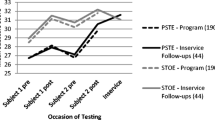Abstract
It is problematic whether primary teachers benefit by completing a first degree especially when the teaching of specific subjects, here science, is the focus of attention. This study reports the comparative results of interviewing thirteen Canadian and ten Australian student teachers, both about to commence their Bachelor of Education. The Canadian students had completed an initial degree while nine of the Australian students were school leavers. The interviews, which explored views about teaching primary science, were analysed with this factor in mind. Student teacher perceptions reported include: how to recognise a “good” primary science teacher; perceptions of self as a “good” primary science teacher; expectations of how the teacher education program could assist their science teaching; and whether (for the Canadian students) the initial degree will help in becoming a primary science teacher. Analysis of the interviews suggests possible influences a first degree (among other factors) may have on perceptions related to primary science teaching and raises questions about what is the best general approach for preparing primary teachers to teach science effectivly.
Similar content being viewed by others
References
Abell, S. K., & Smith, D. C. (1994). What is science? Preservice elementary teachers' conceptions of the nature of science.International Journal of Science Education, 16(4), 475–487.
Anderson, R., & Mitchener, C. (1995). Research on science teacher education. In D. Gabel (Ed.),Handbook of research on science teaching and learning (pp. 3–44) New York: MacMillan.
Appleton, K. (1992, July).Discipline knowledge and confidence to teach science: Self perceptions of primary teacher education students. Paper presented at the Australasian Science Education Research Association Conference, Hamilton, New Zealand.
Association for Science Education (ASE). (1988).Initiatives in primary science: An evaluation report. Hatfield, Herts: Association for Science Education.
Burry, J. A., & Bolland, K. A. (1992). Describing expert science teaching.Journal of Personnel Evaluation, 5, 313–319.
Carter, K. (1990). Teachers' knowledge and learning to teach. In W. R. Houston (Ed.),Handbook of research on teacher education (pp. 291–310). New York: Macmillan.
Calderhead, J., & Robson, M. (1991). Images of teaching: Student teachers' early conceptions of classroom practice.Teaching and Teacher Education, 7(1), 1–8.
Department of Employment, Education and Training (DEET). (1989a).Discipline review of teacher education in mathematics and science (Vol. 1). Canberra: Australian Government Printing Service.
Department of Employment, Education and Training (DEET). (1989b).Discipline review of teacher education in mathematics and science (Vol. 2). Canberra: Australian Government Printing Service.
Feiman-Nemser, S. (1990). Teacher preparation: Structural and conceptual alternatives. In W. R. Houston (Ed.),Handbook of research on teacher education (pp. 212–233). New York: Macmillan.
Greene, M. L., & Campbell, C. (1993).Becoming a teacher: The contribution of teacher education. Lethbridge: University of Lethbridge, Alberta.
Grossman, P. L., Wilson, S. M., & Shulman, L. S. (1989). Teachers of substance: Subject matter knowledge for teaching. In M. Reynolds (Ed.)Knowledge base for beginning teachers (pp. 23–26). New York: Pergamon.
Gunstone, R., Slattery, M., Baird, J. R., & Northfield, J. (1993). A case study exploration of development in preservice science teachers.Science Education, 77(1), 47–73.
Gustafson, B. F., & Rowell, P. (1995). Elementary preservice teachers: Constructing conceptions about learning science, teaching science, and the nature of science.International Journal of Science Education, 17(5), 589–605.
Harlen, W. (1992).The teaching of science. London: Fulton.
Huff, P., Burchart, B., Butts, D., Tweist, G., Krause, J., Ukens, L., Fuller, M., & McCurdy, M. (1988). Excellence in elementary science. In J. E. Penick, & M. Bame (Eds.),Focus on excellence: Elementary science revisited (pp. 6–9). Washington: National Science Teachers' Association.
Kagan, D. M. (1992). Professional growth among preservice and beginning teachers.Review of Educational Research, 62(2), 129–169.
Kruger, C., & Summers, M. (1989). An investigation of some primary teachers' understanding of changes in materials.School Science Review, 71(225), 17–27.
Lederman, N. G., & Gess-Newsome, J. (1991). Metamorphosis, adaption, or evolution? Preservice science teachers' concerns and perceptions of teaching and planning.Science Education, 75(4), 443–456.
Lederman, N. G., Gess-Newsome, J., & Latz, M. S. (1994). The nature and development of preservice science teachers' conceptions of subject matter and pedagogy.Journal of Research in Science Teaching, 31(2), 129–146.
Shulman, L. (1987). Knowledge and teaching: Foundations of the new reform.Harvard Educational Review, 57, 1–22.
Skamp, K. (1995). Student teachers' perceptions of how to recognise a good primary science teacher: Does two years in a teacher education program make a difference?Research in Science Education, 25(4), 395–429.
Skamp, K. (1996, July). Student teachers' entry perceptions about teaching primary science. Does a degree make a difference? Paper presented at the Australasian Science Education Research Association Conference, Canberra.
Sydney University. (1995).1996 Master of Teaching (Primary and Secondary Education) Brochure. Sydney: Faculty of Education, Sydney University.
Tobin, K., & Fraser, B. J. (1989). Case studies of exemplary science and mathematics teaching.School Science and Mathematics, 89 (4), 321–334.
Tobin, K., Roth, W-M., & Brush, S. (1995). Teaching physics to prospective elementary teachers.Research in Science Education, 25(3), 267–281.
Weinstein, C. S. (1990). Beliefs of prospective elementary teachers.Teaching and Teacher Education, 6(3), 279–290.
Author information
Authors and Affiliations
Corresponding author
Rights and permissions
About this article
Cite this article
Skamp, K. Student teachers' entry perceptions about teaching primary science: Does a first degree make a difference?. Research in Science Education 27, 515–539 (1997). https://doi.org/10.1007/BF02461478
Issue Date:
DOI: https://doi.org/10.1007/BF02461478




